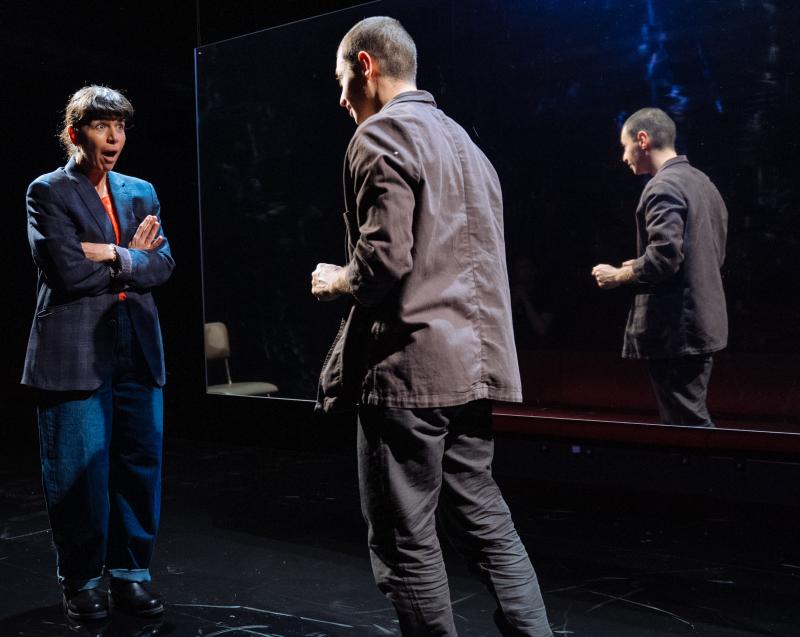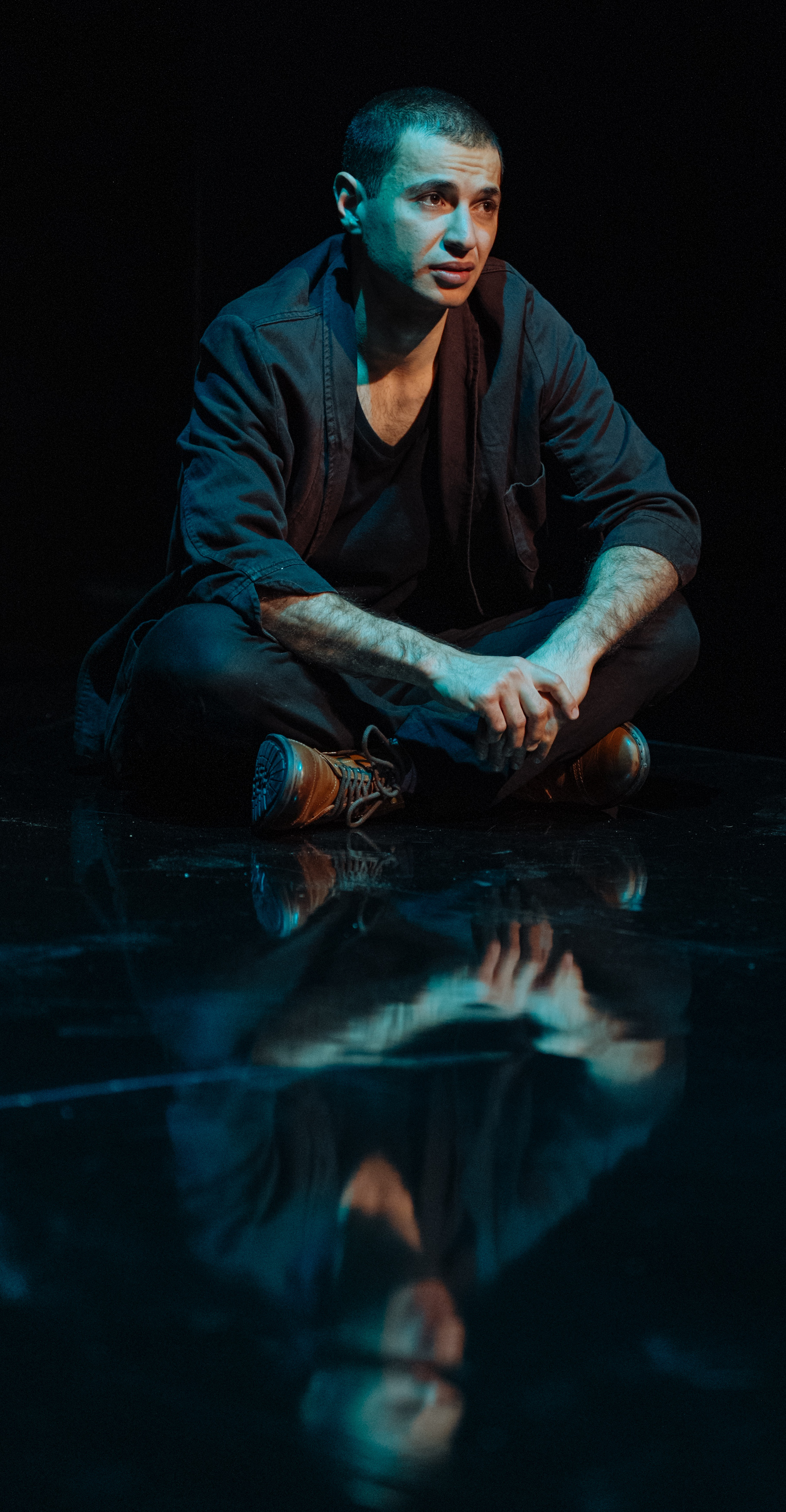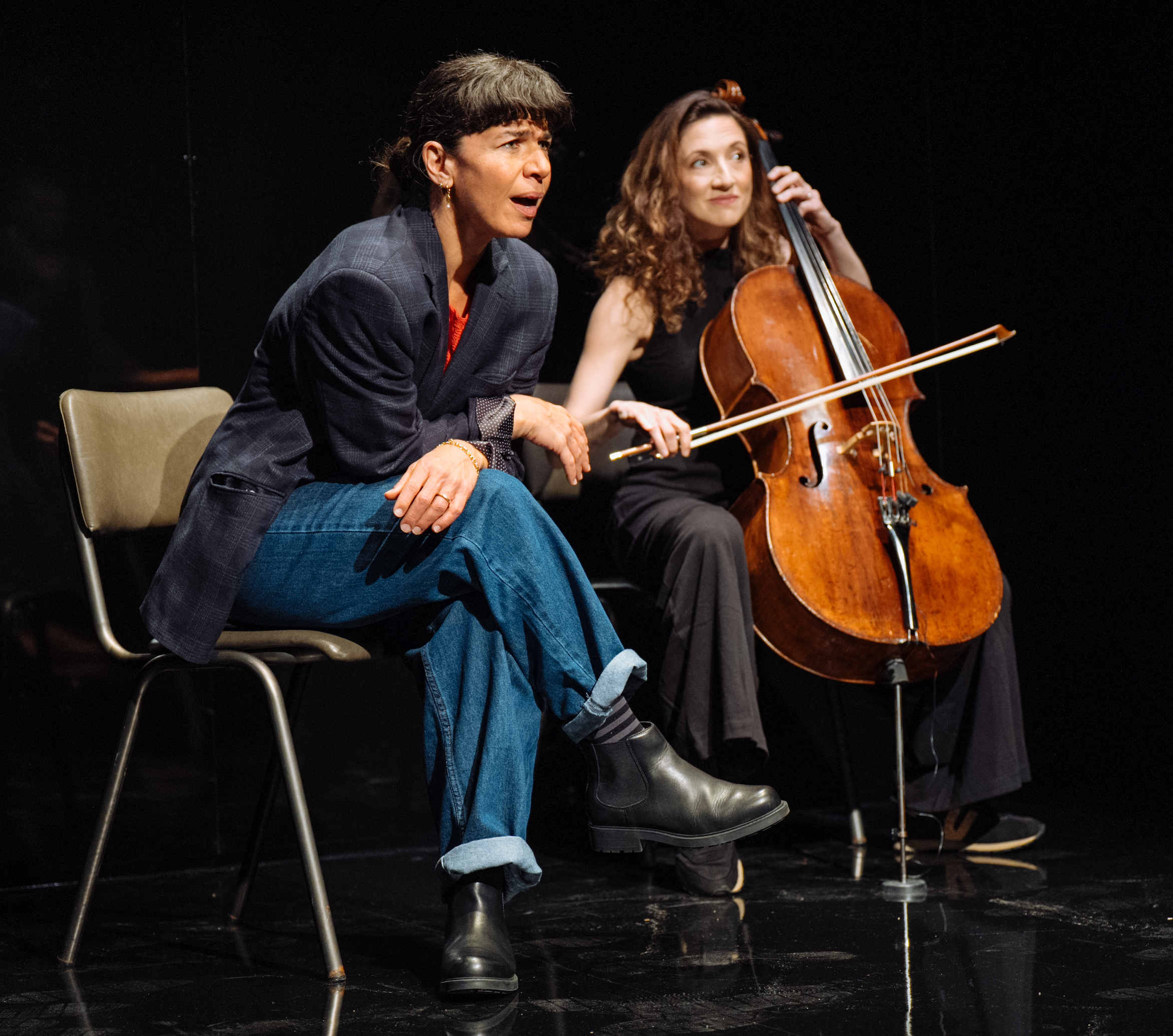Letters from Max, Hampstead Theatre review - inventively staged tale of two friends fighting loss with poetry | reviews, news & interviews
Letters from Max, Hampstead Theatre review - inventively staged tale of two friends fighting loss with poetry
Letters from Max, Hampstead Theatre review - inventively staged tale of two friends fighting loss with poetry
Sarah Ruhl turns her bond with a student into a lesson in how to love

In 2012, the award-winning American writer Sarah Ruhl met a Yale playwriting student who became a special part of her life. Out of their friendship she created Letters from Max, a 2018 book of their correspondence, then a play performed in New York in 2023.
On the page, it’s a piece with a level of diction befitting two poets who like to recite their latest work to each other, sometimes more like a poetry reading than a play. But interspersed is the sparky dialogue between the two, the skinny student in his early twenties and the established playwright, mother of three, two decades older. Together they share thoughts and witticisms about everything from love to soup. Now at the Hampstead, directed by Blanche McIntyre, the piece has been given an impressive staging that turns the venue’s small studio space into something more epic.
It’s not accurate to call this a two-hander as there is a third presence onstage, a cellist, Laura Moody (pictured bottom, with Sirine Saba), whose contributions are as eloquent as any speech. Sitting to the side, she provides sharp strikes of the bow or slithering high notes. At one point it looked as if she would play chunks of the Philip Glass opera Einstein on the Beach, a piece Ruhl and Max bonded over when he asked if he could leave her class early that day to get over to see it at BAM in Brooklyn. Oh, and he would need time to eat properly first, part of his regime for maintaining the weight lost during his teenage bouts of chemo.
 For the Max Ritvo we are seeing suffered from Ewing’s sarcoma as a boy. It was soon to return, bigger and badder, while he struggled to achieve his dream of becoming a published poet. But this is far from a cancer diary, charting decline and grief. The focus is on what each friend brought to the other, the inspirational edge to their relationship.
For the Max Ritvo we are seeing suffered from Ewing’s sarcoma as a boy. It was soon to return, bigger and badder, while he struggled to achieve his dream of becoming a published poet. But this is far from a cancer diary, charting decline and grief. The focus is on what each friend brought to the other, the inspirational edge to their relationship.
We watch as Max dates and falls in love, all the while in a torrent of poetry that bursts through his depleted frame. The scans and tests tell a darker story each time, but the man only stops talking when he literally starts running out of breath. Ruhl supplies a grounding sense, of domestic normalcy, spinning tales of sibling upsets at Harry Potter World that eventually end happily.
Max’s story does not end that way, but this is not a dirge-like occasion, cathartic though it may be. Hampstead is fortunate to have Eric Sirakian (pictured above left) playing Max, an actor who was in a class with him and witnessed first-hand his magnetic personality. Sirakian is neither tall nor skinny, but he has a dynamism that you can be confident Max had too, with a gleam in his eye and a way of mingling with the front row of the audience that doesn’t seem remotely performative. As Ruhl, Sirine Saba is equally convincing, presenting the author as an unshowy woman with a warm personality, great reserves of humour and intellect and a gift for friendship: a “great sense-making force”, as Max describes her.
Elevating the staging even further is its design (by Dick Bird). At each end of the traverse seating are black shiny panels that reflect the action, one of which also stands in for a chalkboard. There is also a large perspex screen hanging down to waist height, dividing the stage lengthwise, which at first seems odd. But it soon shows its value as a way of reflecting the actors back at the audience (while blocking their view of the other chunk of audience facing them across the stage). This means the actors are always visible in the round, no matter where they are positioned. More intriguingly, the screen allows McIntyre to play with the idea that the characters have other selves, as at times two versions of the actor are visible, the real one and their reflection. They can also seem to be together while physically separated by the screen. This reaches a magical climax when Saba and Sirakian move their hands so they seem to be linked, if only in their reflection. Their separation by death is indicated, yet their hands spectrally connect, a sign of the indelible bond they have created, which seems to continue in Ruhl’s dreams.
More intriguingly, the screen allows McIntyre to play with the idea that the characters have other selves, as at times two versions of the actor are visible, the real one and their reflection. They can also seem to be together while physically separated by the screen. This reaches a magical climax when Saba and Sirakian move their hands so they seem to be linked, if only in their reflection. Their separation by death is indicated, yet their hands spectrally connect, a sign of the indelible bond they have created, which seems to continue in Ruhl’s dreams.
Despite its doomy trajectory, this is an uplifting two hours, full of resonating thoughts and the choicest way of expressing them. Max begins as an exuberant man for whom writing is all. As his health deteriorates, he comes to see the world as a clicking game run by machines, with people as its players. Yet when his poetry is finally published, the print run speeded up to beat his death to the finish line, his triumphant whoops of joy are truly a tonic. And although Ruhl’s grief is profound, her mind ticks on: is death, she muses, like the silence between movements in a concert? The two are a perfect image of the dynamic link between great friends, the teacher and the taught alternating roles, nurturing to the end.
rating
Share this article
The future of Arts Journalism
You can stop theartsdesk.com closing!
We urgently need financing to survive. Our fundraising drive has thus far raised £49,000 but we need to reach £100,000 or we will be forced to close. Please contribute here: https://gofund.me/c3f6033d
And if you can forward this information to anyone who might assist, we’d be grateful.

Subscribe to theartsdesk.com
Thank you for continuing to read our work on theartsdesk.com. For unlimited access to every article in its entirety, including our archive of more than 15,000 pieces, we're asking for £5 per month or £40 per year. We feel it's a very good deal, and hope you do too.
To take a subscription now simply click here.
And if you're looking for that extra gift for a friend or family member, why not treat them to a theartsdesk.com gift subscription?
more Theatre
 Othello, Theatre Royal, Haymarket review - a surprising mix of stateliness and ironic humour
David Harewood and Toby Jones at odds
Othello, Theatre Royal, Haymarket review - a surprising mix of stateliness and ironic humour
David Harewood and Toby Jones at odds
 Macbeth, RSC, Stratford review - Glaswegian gangs and ghoulies prove gripping
Sam Heughan's Macbeth cannot quite find a home in a mobster pub
Macbeth, RSC, Stratford review - Glaswegian gangs and ghoulies prove gripping
Sam Heughan's Macbeth cannot quite find a home in a mobster pub
 The Line of Beauty, Almeida Theatre review - the 80s revisited in theatrically ravishing form
Alan Hollinghurst novel is cunningly filleted, very finely acted
The Line of Beauty, Almeida Theatre review - the 80s revisited in theatrically ravishing form
Alan Hollinghurst novel is cunningly filleted, very finely acted
 Wendy & Peter Pan, Barbican Theatre review - mixed bag of panto and comic play, turned up to 11
The RSC adaptation is aimed at children, though all will thrill to its spectacle
Wendy & Peter Pan, Barbican Theatre review - mixed bag of panto and comic play, turned up to 11
The RSC adaptation is aimed at children, though all will thrill to its spectacle
 Hedda, Orange Tree Theatre review - a monument reimagined, perhaps even improved
Scandinavian masterpiece transplanted into a London reeling from the ravages of war
Hedda, Orange Tree Theatre review - a monument reimagined, perhaps even improved
Scandinavian masterpiece transplanted into a London reeling from the ravages of war
 The Assembled Parties, Hampstead review - a rarity, a well-made play delivered straight
Witty but poignant tribute to the strength of family ties as all around disintegrates
The Assembled Parties, Hampstead review - a rarity, a well-made play delivered straight
Witty but poignant tribute to the strength of family ties as all around disintegrates
 Mary Page Marlowe, Old Vic review - a starry portrait of a splintered life
Tracy Letts's Off Broadway play makes a shimmeringly powerful London debut
Mary Page Marlowe, Old Vic review - a starry portrait of a splintered life
Tracy Letts's Off Broadway play makes a shimmeringly powerful London debut
 Little Brother, Soho Theatre review - light, bright but emotionally true
This Verity Bargate Award-winning dramedy is entertaining as well as thought provoking
Little Brother, Soho Theatre review - light, bright but emotionally true
This Verity Bargate Award-winning dramedy is entertaining as well as thought provoking
 The Unbelievers, Royal Court Theatre - grimly compelling, powerfully performed
Nick Payne's new play is amongst his best
The Unbelievers, Royal Court Theatre - grimly compelling, powerfully performed
Nick Payne's new play is amongst his best
 The Maids, Donmar Warehouse review - vibrant cast lost in a spectacular-looking fever dream
Kip Williams revises Genet, with little gained in the update except eye-popping visuals
The Maids, Donmar Warehouse review - vibrant cast lost in a spectacular-looking fever dream
Kip Williams revises Genet, with little gained in the update except eye-popping visuals
 Ragdoll, Jermyn Street Theatre review - compelling and emotionally truthful
Katherine Moar returns with a Patty Hearst-inspired follow up to her debut hit 'Farm Hall'
Ragdoll, Jermyn Street Theatre review - compelling and emotionally truthful
Katherine Moar returns with a Patty Hearst-inspired follow up to her debut hit 'Farm Hall'
 Troilus and Cressida, Globe Theatre review - a 'problem play' with added problems
Raucous and carnivalesque, but also ugly and incomprehensible
Troilus and Cressida, Globe Theatre review - a 'problem play' with added problems
Raucous and carnivalesque, but also ugly and incomprehensible

Add comment